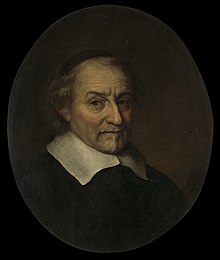
Back Joost van den Vondel AF فان دن فوندل Arabic فان دن فوندل ARZ Іост ван дэн Вондэл BE Ёст ван дэн Вондэль BE-X-OLD Joost van den Vondel BR Joost van den Vondel Catalan Joost van den Vondel Czech Joost van den Vondel CY Joost van den Vondel Danish
Joost van den Vondel | |
|---|---|
 Vondel in 1665 by Philips Koninck | |
| Born | 17 November 1587 Cologne, Holy Roman Empire |
| Died | 5 February 1679 (aged 91) Amsterdam, Dutch Republic |
| Occupation |
|
| Period | Dutch Golden Age |
| Literary movement | Baroque |
| Spouse |
Mayken de Wolff
(m. 1610; died 1635) |
| Children | 5 |
| Signature | |
Joost van den Vondel (Dutch: [ˈjoːst fɑn də(ɱ) ˈvɔndəl];[a] 17 November 1587 – 5 February 1679) was a Dutch playwright, poet, literary translator and writer. He is generally regarded as the greatest writer in the Dutch language as well as an important figure in the history of Western literature.[1][2] In his native country, Vondel is often called the "Prince of Poets" and the Dutch language is sometimes referred to as "the language of Vondel".[3][b] His oeuvre consists of 33 plays, a large number of poems in different genres and forms, an epic poem and many translations of predominantly classical literature.[4] Vondel lived in the Dutch Republic during the Eighty Years' War and became the leading literary figure of the Dutch Golden Age.
Although Vondel was born in Cologne, his family, who were Mennonites, originally came from Antwerp, but had to flee after the fall of the city in 1585. They settled in Cologne, but were persecuted there as well. Eventually they moved to Amsterdam in the then newly formed Dutch Republic.[5] In Amsterdam, Vondel joined the Chamber of rhetoric, a literary society where members studied and composed poetry together.[6] This was the start of his long career as a writer. In 1610 he married Mayken de Wolff, with whom he had five children, of which three died in infancy.[7] A pivotal moment in Vondel's life was his conversion to Catholicism, which was met with controversy in the then dominant Protestant society of the Dutch Republic. In his later life Vondel dedicated himself almost exclusively to his dramatic work and religious poetry. He wrote plays until he was 80 years old and eventually died in Amsterdam at the age of 91.
Vondel's earliest known poem dates from 1605.[8][9] The first play Vondel wrote was Het Pascha in 1612 and his last Noach, written in 1667. Vondel primarily wrote tragedies, of which a great deal were written in the period between 1654 and 1667. Although his Palamedes (1625) and Gijsbrecht van Aemstel (1637) are acclaimed works, the tragedies he wrote after 1654 are considered to be the highlights of his oeuvre. Plays like Lucifer, Jephta, Adam in ballingschap (Adam in exile) and Noach are among Vondel's most celebrated works and are consistently ranked among the greatest works of Dutch literature. Especially Lucifer is almost by common consent regarded as Vondel's masterpiece.[10] Like his plays, Vondel's poetry is acclaimed as well, in particular for the virtuosic style and mastery of verse.[11] Notable poems include Het stockske van Oldenbarneveldt ("The Cane of Oldenbarnevelt"), Roskam (Curry Comb) and Kinder-lijck (Childlike), about the death of his son.
Cite error: There are <ref group=lower-alpha> tags or {{efn}} templates on this page, but the references will not show without a {{reflist|group=lower-alpha}} template or {{notelist}} template (see the help page).
- ^ De Vries 1916, p. 294.
- ^ Noak 2012, p. 116.
- ^ Schenkeveld-van der Dussen 2012, p. 7.
- ^ Konst 1989, p. 85.
- ^ Calis 2008, p. 45-46.
- ^ Calis 2008, p. 58.
- ^ Calis 2008, p. 67.
- ^ Brandt 1682, p. 15.
- ^ Calis 2008, p. 57.
- ^ Knuvelder 1971, p. 356.
- ^ Weevers 1960, p. 93 & 116.